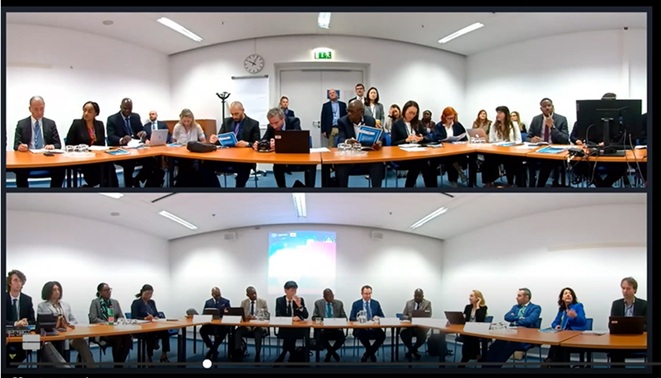Mozambique: Indian group RITES begins delivery of first 10 locomotives to CFM
Integrating the private sector in Mozambique’s fight against terrorism and organized crime – UNODC

Image: UNODC
At the 34th Session of the Commission on Crime Prevention and Criminal Justice (CCPCJ), UNODC organized a side event on “Leveraging Private Sector Resources to Combat Terrorism and Organized Crime: Lessons Learned from Mozambique”, supported by the Government of Japan, to showcase a pioneering model of public-private collaboration in the fight against terrorism and organized crime.
Mozambique’s northern province Cabo Delgado has faced terrorist attacks since 2017, resulting in the displacement of over one million people and the deaths of approximately 6,500. Despite ongoing military interventions by Mozambican and regional security forces, attacks have continued. In 2025, attacks have continued to occur regularly, underscoring the enduring nature of the threat. This volatile environment not only exacerbates socio-economic vulnerabilities but also heightens the risk of recruitment by extremist groups, potentially extending the threat beyond national borders.
In response, UNODC facilitated a series of meetings in 2024, convening Mozambique’s criminal justice institutions with private sector stakeholders, including mobile network operators, digital wallet providers, and banks. This collaboration yielded measurable results, significantly improving operational efficiency and institutional cooperation. Response times for mobile data requests were drastically reduced—from three months to as little as 48 hours—accelerating data access and enabling timely action. Law enforcement agencies gained access to critical information such as call logs, geolocation data, and communications metadata, enhancing their investigative capabilities.
UNODC’s side event aimed to showcase Mozambique’s public-private partnership model, encourage policy dialogue on improving investigative and prosecutorial systems, and promote the adoption of similar models in other regions facing security threats.
During the opening session, Mr. Ilídio José Miguel, Director, National Penitentiary System of Mozambique highlighted the country’s first case of terrorist financing. He emphasized that the case was resolved successfully due to strong cooperation between government agencies and private companies. Banks contributed essential financial data, and telecom firms helped monitor communications and transactions.
During his remarks, H.E. Ambassador Atsushi Kaifu, Permanent Representative of Japan to the United Nations in Vienna, emphasized the strength and collaboration between criminal justice agencies and the private sector, and noted that the partnerships with mobile operators have expedited investigators’ access to crucial data, while banks have improved the tracking of criminal activities stemming from terrorist attacks.
Mr. Roberto Arbitrio, Chief of the UNODC Terrorism Prevention Branch, underscored the need to enhance collaboration to address existing challenges and stated that “the misuse of emerging technologies for terrorist purposes and new avenues for terrorist financing highlight the need for enhanced collaboration with the private sector to adapt to new modus operandi, and accelerate our efforts to curb organized crime and terrorist groups.”
The integration of the private sector into counter-terrorism and organized crime strategies, as seen in Mozambique, highlights how countries can strengthen justice systems through broader collaboration. This side event positioned Mozambique as a practical example of how coordinated partnerships can deliver tangible, impactful results.












Leave a Reply
Be the First to Comment!
You must be logged in to post a comment.
You must be logged in to post a comment.